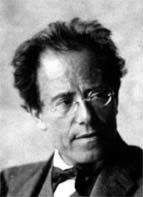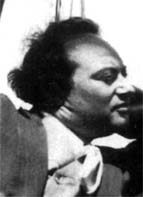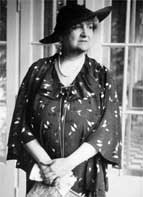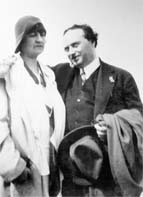| |

|
 | | | Alma's relation to Judaism Paulus Manker
Talking about Alma and her husbands Mahler and Werfel, we have to talk about her relation to Judaism. Joshua Sobol
Alma didn´t seem to be a great lover of Jews in general. She was not a admirer of Jews, but she said once that she could not live without, and she could not imagine her life without Jews, that both, Mahler and Werfel, ment a lot to her, and probably because they were Jewish. That played an important part.
The funny thing is that Alma picked those two great persons who were physically very non-attractive. On the other hand with Gropius, who was very attractive, she did not seem to develop a very deep relationship. It was shallow, it was short, short lived, and somehow he bored her. That was my impression when I read what she had to say about Gropius, the way she dismissed him. It is very interesting to see that Alma speaks with such great enthusiasm about his physical beauty, and then she just dismisses him, and takes that unenchanting person - physically speaking - of Werfel, who was a spoiled child, and had this tendency to grow fat, and became very, very heavy later.
| |  |  |  |  |  | 
left: Gustav Mahler
center: Franz Werfel
right: Alma Mahler-Werfel | | |
What attracted her to Jews? I am speculating here, but I think that she felt that the Jewish spirit at that moment in history was probably very much alive, and very much at the front line of artistic expression. It had to do with the fact that Jews were freshly emancipated, that Jewish young artists or writers were given the freedom to join the European society in the German cultural circle, to join German society only a few decades earlier. And the urge to join, and to cut a place for themselves in that culture made them extremely creative.
| |  |  |  | 
left: Alma and Franz Werfel
right: Alma with Franz Werfel in Palestine, 1930 | | |
I think it has also to do with the fact that the Jews were beween two cultures or sometimes between three cultures, like Mahler was. Mahler was born in Bohemia, he grew up in the German culture in Vienna, he was neither Bohemian, he was nor Viennese, nor German, he was a Bohemian Jew. And the fact that he grew up on the crossing borders between these three cultures, fertilized him very much. We hear it in his music, Leonhard Bernstein made great efforts to prove that Mahler´s music is full with Jewish motives, and he interpreted almost everything in Mahler´s music as a transformation of Jewish themes. There is obviously a very strong influence of Jewish themes in Mahler´s music. But there ist also a very strong influence of Wagner on his music, there is a very strong influence of the German tradition on Mahler. And Werfel also came from a Jewish family, and grew up on the borderland between Judaism and Christianity. He was flirting with the idea of converting to Christianity. On the other hand when he went to Palastine with Alma, this contact with the new Jewish life in Palestine, the renewal of Jewish existence there, shattered him, and he decided to learn Hebrew. That influenced him in a very strong way: he decided not to convert to Christianity, but he played with the idea to bring together modern Judiasm and Christianity. Alma felt that these Jewish artists and writers at that moment in history were extremely meaningful to the history of art and literature. This was one of the things that attracted her to them, or made them attractive to her. Alma was interested in that front line of what was taking place in art. This was one of the reasons that she was choosing and picking out those Jews. | | |
